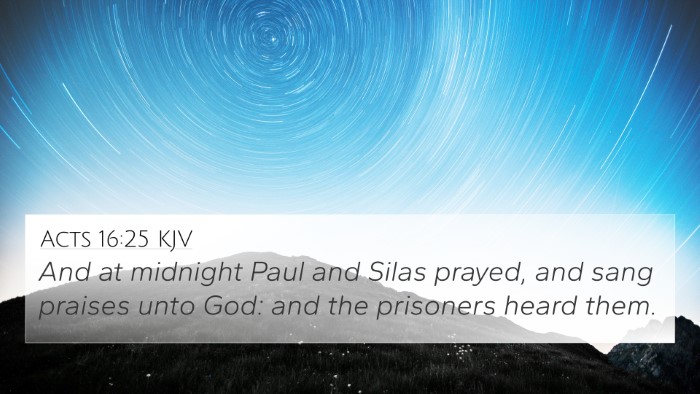Psalms 77:6 - A Deeper Understanding
Psalms 77:6 states, "I remembered my song in the night: I commune with mine own heart, and my spirit made diligent search." This verse highlights a moment of introspection and the struggle to reconcile feelings of distress with the memory of praise through music. The psalmist gives us insights into how faith and emotional turmoil can coexist.
Summary of Biblical Insight
In examining Psalms 77:6, several public domain commentaries provide depth to its meaning:
-
Matthew Henry:
Henry emphasizes that the psalmist's act of remembering a song shows the importance of worship and praise, even in difficult times. The night represents a time of trouble, and the remembrance of a song indicates a yearning for joy and a connection to God amidst despair.
-
Albert Barnes:
Barnes reflects on the internal dialogue taking place within the psalmist. By communing with his own heart and spirit, he shows a process of self-examination and the search for solace. The song symbolizes past joy, and the diligent search represents a pursuit of understanding and comfort from God.
-
Adam Clarke:
Clarke suggests that the psalmist's recollection of a song during the night signifies a deep need for spiritual reassurance. He points out that songs can be a source of strength, helping the believer to reflect on God’s past faithfulness and to find hope in despair.
Connections to Other Bible Verses
As we explore this verse, we can find several related passages that expand on its themes of remembrance, distress, and worship:
- Psalm 42:6: "O my God, my soul is cast down within me; therefore I remember you from the land of Jordan and from Hermon." - The psalmist speaks of remembering God in times of sorrow.
- 1 Thessalonians 5:16-18: "Rejoice always, pray without ceasing, give thanks in all circumstances; for this is the will of God in Christ Jesus for you." - Encourages maintaining a spirit of praise and thanksgiving, paralleling the theme of song in the night.
- Psalms 119:55: "I remember your name in the night, O Lord, and keep your law." - A direct connection to remembering God during dark times.
- Psalms 30:5: "Weeping may endure for a night, but joy comes in the morning." - This emphasizes the transition from sorrow to joy, mirroring the inner search for comfort.
- James 1:2-3: "Count it all joy, my brothers, when you meet trials of various kinds, for you know that the testing of your faith produces steadfastness." - Highlights the growth that can arise from trials.
- Isaiah 26:3: "You keep him in perfect peace whose mind is stayed on you, because he trusts in you." - Speaks to the peace that comes from focusing on God during difficult times.
- Psalms 91:2: "I will say to the Lord, 'My refuge and my fortress, my God, in whom I trust.'" - A declaration of trust in God amidst challenges.
- Romans 15:13: "May the God of hope fill you with all joy and peace in believing, so that by the power of the Holy Spirit you may abound in hope." - Describes the assurance and hope that faith brings, akin to the psalmist's reflections in solitude.
- Philippians 4:6-7: "Do not be anxious about anything, but in everything by prayer and supplication with thanksgiving let your requests be made known to God." - Encourages communication with God as a source of peace during distress.
- Psalms 147:3: "He heals the broken-hearted and binds up their wounds." - Affirms God's concern for emotional pain and His ability to heal.
Cross-Referencing and Thematic Connections
The act of cross-referencing is invaluable for a deeper understanding of Psalms 77:6. This verse opens a dialogue with other scriptures, allowing us to piece together the themes of remembrance, emotional struggle, and divine comfort.
When cross-referencing Biblical texts, we see patterns and thematic connections that enrich our understanding. The themes of sorrow and remembrance in Psalms 77:6 are not isolated but echo throughout scripture.
Utilizing tools for Bible cross-referencing such as a bible concordance or a bible cross-reference guide can greatly enhance personal study. By understanding these connections, we can see the bigger picture of God’s narrative and our place within it.
Engaging in cross-reference Bible study methods allows us to observe how the emotional states articulated in the Psalms are addressed in both the Old and New Testaments, providing continuity and context to our spiritual journey.
Practical Application in Modern Faith
The essence of Psalms 77:6 encourages believers to recall their songs, particularly in times of struggle. Incorporating moments of worship and reflection, even in the darkest hours, can cultivate resilience and hope.
By linking Bible scriptures that illuminate the journey from despair to hope, believers can find assurance in the promises of God. This process not only aids in individual prayer and reflection but also serves as a powerful template for sermon preparation and discipleship.
Conclusion
In summary, Psalms 77:6 is rich in meaning and deeply interconnected with other biblical texts. Through diligent search and remembrance of praise, believers can navigate their struggles and emerge strengthened. Cross-referencing these themes enhances understanding and offers practical tools for sustaining faith amidst life's challenges.













